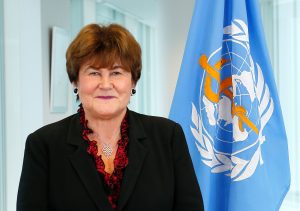Zsuzsanna Jakab, WHO Regional Director for Europe, on the importance of the 17 Sustainable Development Goals for the health sector and why we are currently living at the expense of the present and future generations.
Interview: Dietmar Schobel
HEALTHY EUROPE
Can you explain the importance of the 17 Sustainable Development Goals of the United Nations for the health sector?
Zsuzsanna Jakab: The adoption of the 2030 Agenda and the universal commitment to the Sustainable Development Goals (SDGs) create unique momentum for public health. The implementation of the SDGs will contribute to the full realization of human rights and fundamental freedoms for all, including the right of everyone to the highest attainable standard of physical and mental health. Also, the adoption of the 2030 Agenda has clearly shown that the vision of the international community is converging, and that there are growing signs of solidarity in the world. We have unprecedented political determination to strengthen health systems towards universal health coverage, strengthen primary health care, combat major diseases and address the multiple determinants of health through the achievement of all SDGs.
HEALTHY EUROPE
How can the health sector contribute to reaching all the SDGs together?
Zsuzsanna Jakab: Obviously, its main contribution is the implementation of SDG 3, the “health goal”, which is the most powerful tool for operationalizing health in all policies. This is underpinned by universal health coverage, which is the flagship of the new global vision for WHO approved by Member States at the World Health Assembly in May this year. But health targets are not limited to SDG 3 – almost all of the other 16 goals are directly related to health or contribute to health indirectly.
HEALTHY EUROPE
The health sector is connected to all other societal sectors. Should health therefore be an overarching goal in the context of the SDGs?

Zsuzsanna Jakab: Health is an overarching goal. Without health we cannot achieve the SDGs, and to achieve health we need to accomplish all of the SDGs. The SDGs have strong interconnections that extend to all sectors. If properly implemented, actions to achieve the SDGs should span many spheres of governance (such as legal, institutional, technical and fiscal realms) and many sectors (such as those focused on agriculture, transport, energy, justice, welfare, education, security, industry and housing). Ultimately, this will improve people’s living conditions; increase capacity; improve social, environmental and financial protection; create a greener society; and increase security at all levels.
Health is an overarching goal.
ZSUZSANNA JAKAB, WHO REGIONAL DIRECTOR FOR EUROPE
HEALTHY EUROPE
Sustainability means not living at the expense of future generations. Is this currently the case – in Europe and globally?
Zsuzsanna Jakab: Let me clarify: sustainability means not living at the expense of future or present generations. How societies live, consume and produce continues to be disconnected from natural environments as a result of long-standing patterns and practices in policies, institutions, technologies and lifestyles. Despite improvements in the last decades, Europe’s ecological footprint is large. If everyone on the planet had the same ecological footprint as the average resident of the European Union, we would need approximately 2.6 Earths to support our demands on nature. We are living not only at the expense of future generations, but also at the expense of the present generation.
HEALTHY EUROPE
The SDGs are not legally binding. What importance do they have in the practical policy of nations?
Zsuzsanna Jakab: The fact that the 2030 Agenda is universal, for high- and low-income countries alike, provides an unprecedented opportunity for global governance. Although it is not legally binding, we see more and more countries, international actors and stakeholders engaged in implementing and contributing to the 2030 Agenda and achieving the SDGs. We can see this commitment in, for example, the annual reporting of more than 100 countries worldwide and 36 countries in the Region at the United Nations High-level Political Forum on Sustainable Development.
